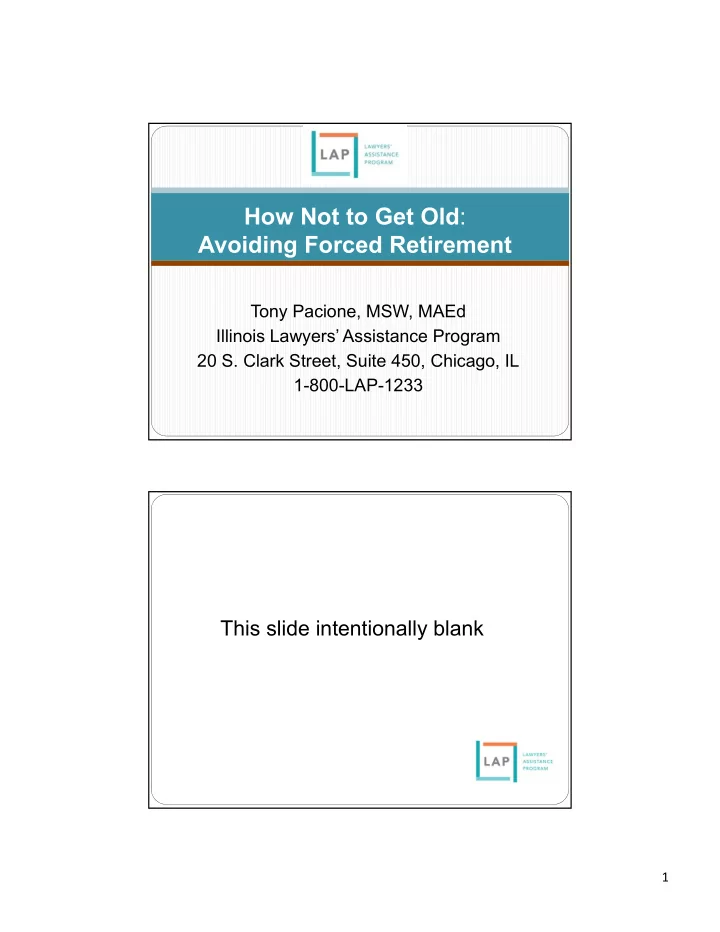

How Not to Get Old : Avoiding Forced Retirement Tony Pacione, MSW, MAEd Illinois Lawyers’ Assistance Program 20 S. Clark Street, Suite 450, Chicago, IL 1-800-LAP-1233 This slide intentionally blank 1
LAP’s Mission • Assist lawyers, judges, and law students Protect public Educate the legal community How Does LAP Work? • Confidential! Supreme Court Rule 2
How Does LAP Work? Who We Serve other 2% psychological Substance 51% 47% 3
Who We Serve self-harm thoughts 3% Anxiety/Stress 43% Depression/Mania 55% Who We Serve 7% 1% 3% 8% 81% Alcohol Stimulants Depressants THC Opiates 4
Age of LAP Clients 75% FY 2017 80% 70% 60% 50% 40% 30% 14% 11% 20% 10% 0% <50 50-60 >60 Aging quickly… In millions 2050 Source: US Census Bureau 90 2040 80 2030 70 2020 60 50 2010 40 30 20 10 0 Number of Americans over 65 5
Elder LAP Clients • Multiple issues • Reluctant to seek help and retire • Higher suicide risk • Greater physical impairment • Increased depression and anxiety Elder LAP Clients • Most solo practitioners, small firms • No succession plan • Most referred by colleagues or family • Financial pressures • Memory vs. judgment, executive functions 6
What to look for “Follow the MAP“ (Pacione & Belleau, ABA Solo Practice Journal, May 2015) M ood or attitudinal disturbances A ppearanceor physical changes P roductivityand quality of work Age Resiliency- Or what I need to do when I Turned 60 • Meeting goals in spite of adversity • Sustained competence under stress • Ability to recover from set backs 7
“Persistent Patience” = Self Efficacy Self Efficacy Awareness of your limits • Taking risks, not chances Confidence in problem solving ability Maintain focus in accomplishing goals Comfortable with resources, and asking for help Willingness to invest effort Intrepid of the Unknown Based on Bandura 1977, 1994 8
Staying in “Control” Do not let what you cannot do interfere with what you can do. John wooden Optimistic Pessimistic External Locus Internal Locus Based on J Rotter 1960 Mindfulness (Based Stress Reduction): Skill Set: 1. Non-judging 5. Acceptance 2. Patience 6. Letting Go 3. Fresh Mind 7. Trust 4. Non-striving J Kabat-Zinn, 1990 9
Courage and Acceptance “I am no longer accepting the things I cannot change: I am changing the things I cannot accept.” Unknown Challenge Your Thinking I dentify the thought C hallenge the thought E valuate the thought Pacione 2003 10
This slide intentionally blank Socially Connected Thoren , 2014 11
Prioritizing Positivity Catalino et al 2014 Emotional - Intellectual Flexibility 12
Silver 2012 Specialized Order Seeking Stalwart- ‘all in’ Ideological Over-Confident Stubborn 13
Multidisciplinary Tolerant of Complexity Attitude of Gratitude Adaptable Empirical Self critical (not criticizing self) Cautious 14
Recommend
More recommend